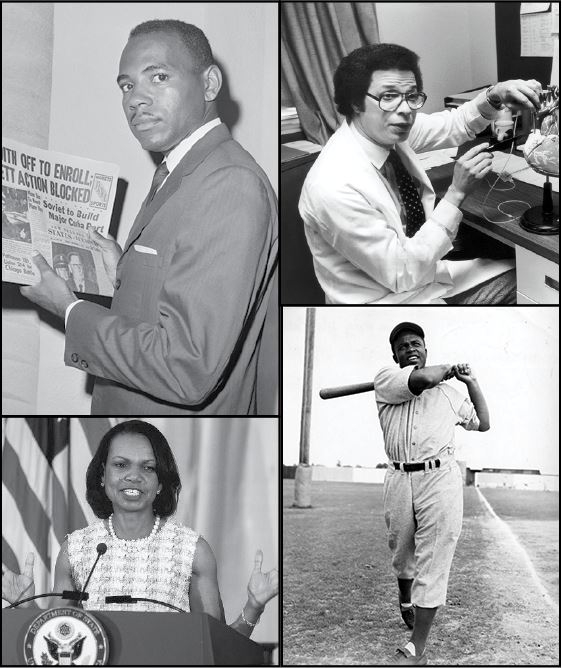The necessity of Black History Month in America
First African American to enroll at University of Mississippi – James Meredith (top left), to implant a heart defibrillator – Levi Watkins Jr. (top right), Female Secretary of State – Condoleezza Rice (bottom left), to play on a Major League Baseball team – Jackie Robinson (bottom right).
February 21, 2018
Every year, as February rolls around, there is one question that continues to linger, unanswered: Is there still a need for Black History Month? Essentially, it is a month dedicated to noteworthy black Americans who deserve to be recognized as such all year long.
However, American history has long excluded the achievements of African-Americans from all walks of life, and because of this, Black History Month continues to be a necessity.
As an example, I still remember the night Barack Obama was elected as the first black president of the United States. He truly inspired hope within our community, yet even with such an amazing accomplishment, it was sad to look back and see that it took this country over 230 years to finally see a black man as presidential.
Black Americans were slaves in this country longer than they have been citizens. A celebration of all we have done in such a short amount of time serves only positive purposes, both within and outside of our community.
These twenty eight days (twenty nine on a good year) seem to be the only opportunity black people have to learn about heroes who look like them.
In “normal” history classes, black history is confined to two chapters: one about the horrors of slavery and another about the triumph of the Civil Rights movement (this one only touching on Martin Luther King Jr. as if he was the only activist of the time period). Finding other black historical figures in between the pages is highly unlikely.
In reality, Black History Month is something that goes unnoticed to most non-black people in the United States every year; this holiday should be celebrated so that they can be reminded that African-Americans are more than the stereotypes that negatively bind them. It should be everyone’s responsibility to acknowledge the month for what it is: a celebration of a historic culture that is overlooked in our day to day lives.
It is a reminder to black people all around the nation that they are more than slavery and civil rights, that they helped get men on the moon and are the reason trivial inventions such as the stoplight exist.
In almost every country, black people have suffered and had to fight for basic human rights. It’s time to show the world who we really are, and Black History Month is the perfect time to do so.
While some say that Black History Month falls under the term “self segregation,” there is a reason African-American communities have felt the need to form their own “safe spaces” where they can be recognized respectfully. It is for the same reason the BET and the NAACP Image Awards were created; Black Americans have been forced into self segregation because of America’s reluctance to truly include black people in the social and historical narrative of everything from the entertainment industry to the medical field.
So, yes, in a perfect world we wouldn’t need such a trivial label and time frame for history that should be taught everyday. Sadly, the world we live in is riddled with reasons why Black History Month remains a necessity.









